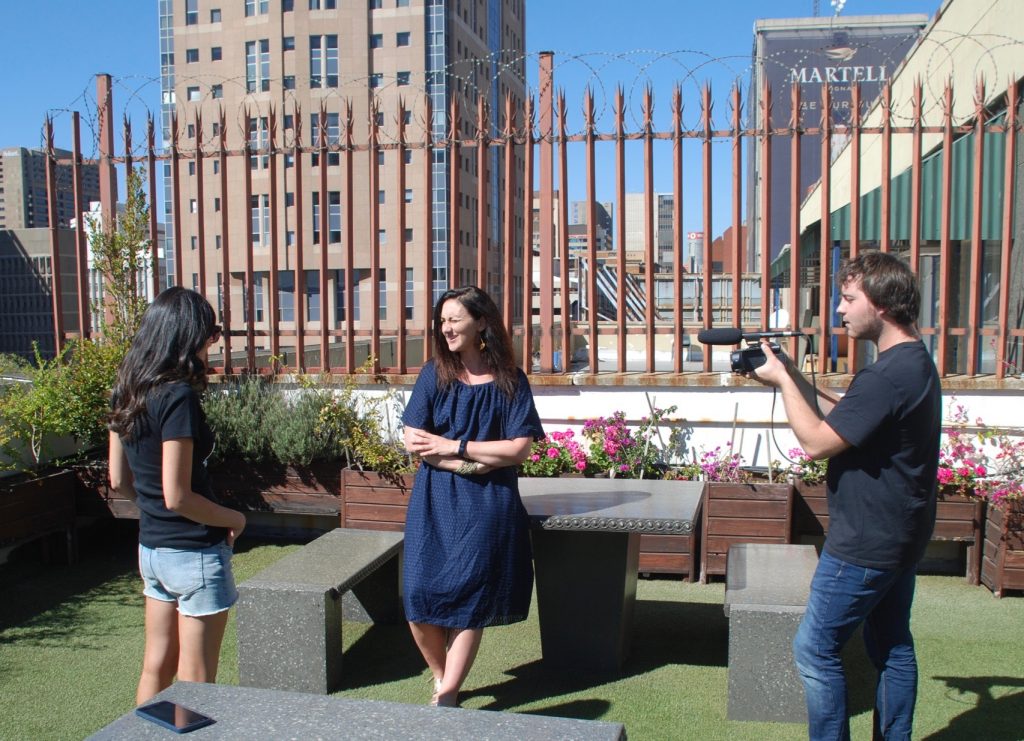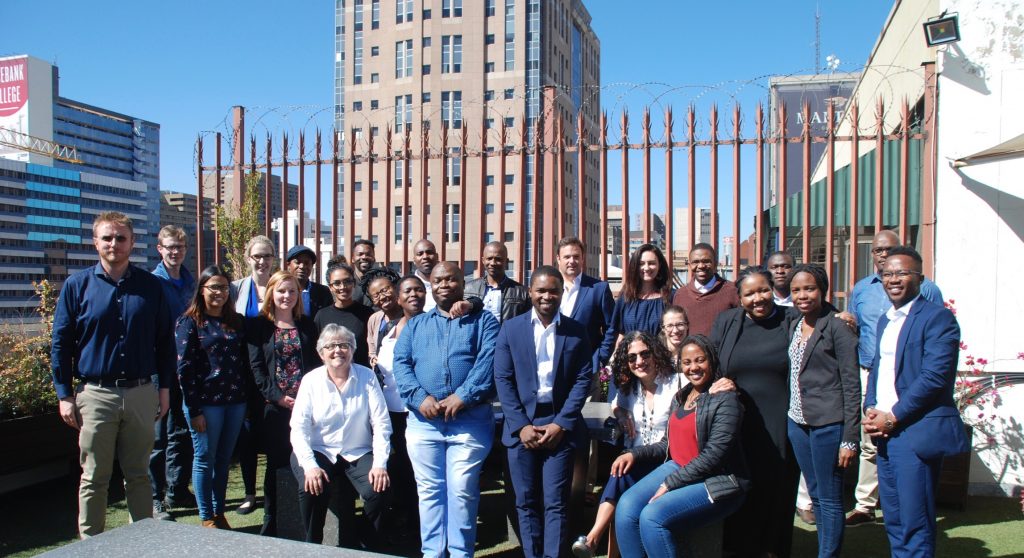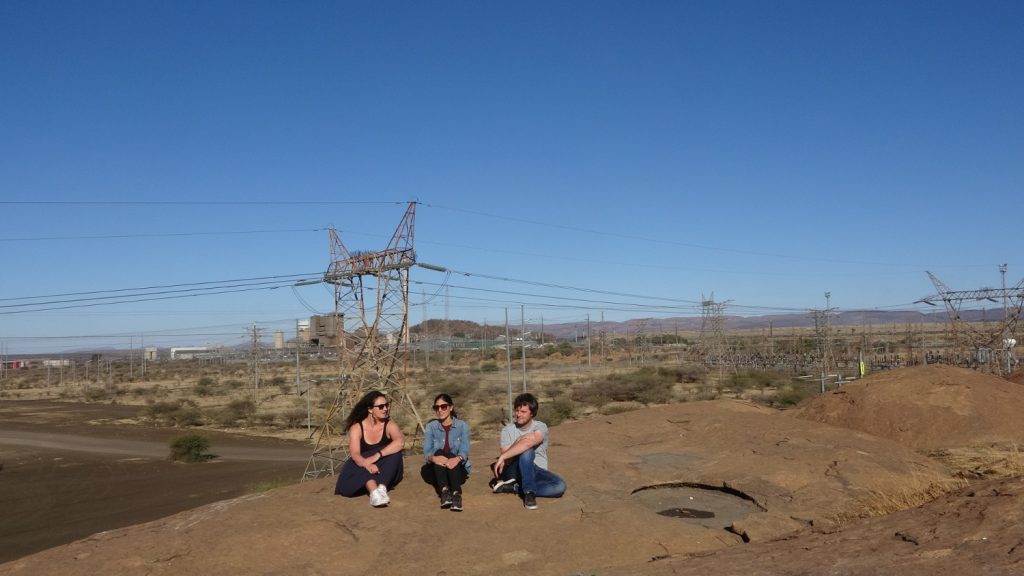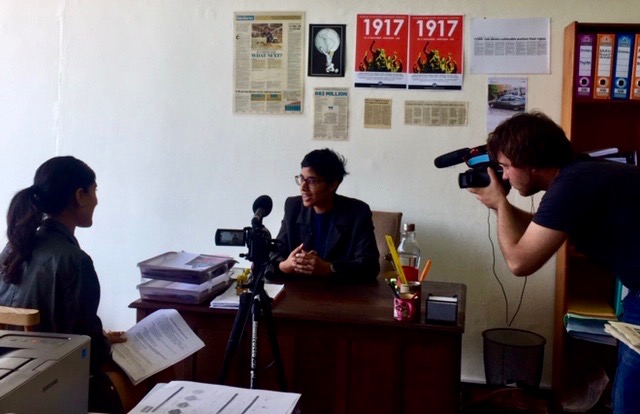Training a new generation of human rights lawyers in South Africa
In post-apartheid South Africa, the next generation of human rights lawyers play a vital role in expanding access to legal services in South Africa, and in implementing the new Constitution to include all citizens. Their work addresses significant but often unpopular issues: housing; healthcare; education; land reform; free expression; actions against the police; and environmental law work. Their clients are trades unions, community leaders, activists, the poor and the vulnerable; their opponent is usually the government. However, unlike advocates in the UK, most of these young lawyers have little or no formal training in advocacy skills, but face well-trained opponents in court.

In 2016, Nikki Walsh of City Law School and Stuart Wilson the Executive Director of leading South African NGO, Socio-Economic Rights Institute (SERI) obtained funding from the BERTHA foundation to design and run a four day training course on courtroom skills for junior human rights lawyers. The training is offered completely for free and is specifically aimed at young black lawyers who tend not to have had the same access to education as their white counterparts. These lawyers are themselves disadvantaged, and represent the disadvantaged. The course aims to build confidence, redress the skills deficit and give these lawyers the tools necessary to advocate effectively for poor and vulnerable South Africans across a variety of courts and jurisdictions.
The training has run annually each September for the past three years and 60 human rights lawyers have now attended from NGOS from across the whole of South Africa. Three City Law School staff, Nikki, Stuart Lindsay and Simone Start, have designed courses in trial skills, and bail hearings with papers that involve issues that are current in the South African context. The project has created substantial links between CLS and the South African judiciary, legal profession and NGO sector. The City team each year trains alongside leading South African human rights practitioners such as Anna-Marie de Vos, Senior Counsel, Gcina Malind, Senior Counsel, and former Constitutional Court Judge , Zak Yacoob. On the most recent trip, Brian Richardson, a senior barrister at Michael Mansfield’s Chambers, Nexus Chambers, London, joined the team.

In Sept 2018, as BERTHA’s 3 year funding allocation expired, and the continuation of the project was at risk, Nikki set out to make a short film to show importance of the training for these young lawyers and the impact it has on their ability to carry out critical social justice work. Nikki obtained funding from City’s HEIF fund to finance two City students (now graduates) as film assistants, Ilya Melnikov of CASS, and Mojgan Sherkat of SASS to travel to Johannesburg to help her shoot and edit the film. This gave an unparalleled opportunity to two City students to undertake filming in townships, informal settlements and to see a side to South Africa that is rarely available to outsiders.
The film was part of the funding application to the BERTHA foundation which awarded another 3 years funding. Here’s the film!
Excitingly Nikki was also interviewed by the BBC about this project on 1st May, together with one of their trainees, Mululeki Marongo. It was broadcast on the World Service this morning and you can catch it on BBC Sounds (around 5:45 minutes).
Let’s hear from Nikki…
Could you give us some insight into what the syllabus includes – it must have been really hard to distill this into 4 days of training?
We decided to bring the 9 months syllabus from London and condense it into 4 days. We start with lectures and exercises on basic skills in questioning techniques, and get these young lawyers up on their feet practising by the end of the first day. On the fourth and final day we replicate the pressure of a hearing in a courtroom as the delegates run a full trial in front of leading South African practitioners. Throughout the course, we are careful to use case papers which reflect areas of law that are current in the South African context to make the training as realistic and useful as possible.
What do the law students in South Africa learn (if it doesn’t include advocacy skills)?
In London a student barrister spends 9 months in a classroom practising courtroom skills which are taking a witness through their testimony , cross- examining an opponent’s witness and making a submission to a judge. In South Africa, fledgling attorneys do not receive advocacy skills training as part of their legal education. This training is not widespread, tends to be only available to members of the Bar, and can be expensive, which particularly prices out those who join the NGO sector.
Was it difficult to get engagement from such influential human rights lawyers? Could you say a bit about the lawyers/judges who participate?
One of the biggest treats for myself and my City colleagues, Simone and Stuart, has been to train each year alongside some of South African leading human rights practitioners. Anna Marie de Vos has been an integral part of our training team and has not missed a single round of it. Anna Marie was the first female High Court Judge in Pretoria, and since her return to practise (as a Senior Counsel , equivalent to Queen’s Counsel in England) she has regularly appeared in South Africa’s Constitutional Court and has just won a number of landmark cases around land rights, and gender. In 2018, Gcina Malindi , another Senior Counsel specialising in labour law, joined our training; Gcina was an active member of the ANC in the liberation struggle, and was imprisoned on Robben Island during the apartheid years as a result. Inevitably, the young delegates are absolutely thrilled to be performing in front of and getting feedback from such eminent practitioners, who are a key part of our success.
Anna Marie de Vos, Former Pretoria High Court Judge and current Senior Counsel
” I find this training astonishingly well organized, well done. It is necessary as it is the only training available to lawyers that do the human rights angle, especially for those in the NGO world. They don’t earn a lot, they could not afford it, so this is a godsend for them
I always look at the real nervous ones and I can’t wait at the end of the week to see how well they perform, how they’ve pulled themselves up and how quickly they learn. And then afterwards, perhaps a year later, you can see them in court and you cannot believe the difference. And you know they are applying methods they learned here on this training.”
Let’s talk to the filming team about the project….Mojgan and Ilya…
Mojgan Sherkat was the producer on the project; she has a strong background in the US broadcast media and is an Emmy nominated Television News reporter. Her primary role in South Africa was to assist Nikki in interviews, story boarding and constructing the documentary narrative, in addition to sound, light and camera duties, as well as agreeing in-country edits with Ilya. She completed her MA in International Communications & Development at City’s School of Arts and Social Sciences.
Ilya Melnikov was primary cameraman, and conducted the post-production phase and final edit back in London. Since graduating from City, Ilya now works as co-writer, camera operator and editor for his own independent film production company Frinin & Bok, making documentary films, short movies, music videos and corporate films. Ilya completed his MSc Management at the CASS Business School, but also has an MA in Film Studies from UCL.

Was this your first time in South Africa? What were your impressions of the country?
Mojgan: It was my first time in South Africa – and I very much enjoyed my time there! The people were friendly and welcoming, their culture and history is rich – there was so much to do, eat, and experience. Johannesburg was rough on the edges, but I never felt unsafe. It had character, its’ own personality and vibe so-to-speak.
My impressions of the places we visited like Marikana and the people we met there, is that there remained a fire and spirit about each, even through all the experiences and suffering they’ve experienced and witnessed.
Ilya: This was also my first trip to South Africa, I had little expectations of the country but after researching its recent history I have realised how important the concept of justice is for the locals. I was pleasantly surprised by the unusual synthesis of various European and African cultures within one country.
How were you recruited to the project? What courses did you study at City?
Mojgan: I was pursuing my second master’s degree in International Communications and Development at City University. The reason why I decided to leave my career behind and pursue a second master’s degree is my passion for giving back in any capacity I can (as cliched as this sounds). I’ve always dreamed of working in the charity, non-profit sector – helping raise social awareness, environmental awareness, etc.
I was interning with the London City Incubator program on campus – my direct boss (Brigita Jurisic) heard about the opportunity to be involved with the film, and she recommended both Ilya and I for the project. We met with Nikki and were both fortunate enough to be taken on!
Ilya: As Mojgan says, we both took part in London City Incubator internship at City University prior to this project. Straight away Mojgan and I established a rapport and were able to collaborate very efficiently throughout the production of the documentary.
The film you’ve created is incredibly powerful; how did you both set about planning for your work here? Had you worked together before?
Mojgan: We had been involved in an internship program together, but did not work together directly at that time – so this was our first project as a team! We met a couple times prior to heading off and tried our best to come up with ‘loose’ plans. But as I had previously worked as a TV news reporter, and as Ilya has worked in film in the past – we both knew it was a matter of getting there and seeing what unfolds! What kinds of material, interviews, videos are we going to get? So, it was really about trusting the process and one another – and hoping for the best!
As people outside of the legal profession, what surprised you most about the experience?
Ilya: I was very excited to see mock trials and hearings performed by people with a range of legal experience. Having never witnessed a proper courtroom setting before I was partially learning how to behave in court by observing the lecturers and young South African Lawyers.
Mojgan: I am still surprised about the kinds of cases these young lawyers take on, and the little experience they have standing in a courtroom prior to taking on such cases!
Indeed, it was shocking to hear that so many young lawyers get so little courtroom skills training, particularly when their opponent is often the government or powerful corporations. Could you say a bit about how you saw these individuals change over the 4 days?
Ilya: It was unbelievable how quickly the participants adapted to tough situations and how much more confident they have become in a course of only 4 days. Already during the second day I could see the lawyers improving tremendously; those who have been quiet before questioned the lecturers and engaged in arguments. By day 4 most if not all of the lawyers were confident in their abilities to speak out and follow official courtroom guidelines.
KHULULIWE BHENGU, Candidate Attorney, SERI
“I come from place was previously an informal settlement in South Africa. I always wanted to be an advocate for my people, especially because you do not see a lot of black female lawyers so I wanted to be that beacon of hope for my community”
Mojgan: It truly was inspiring to see their journey over the 4-day workshop. I too was shocked at how little training they received given the types of cases they take on. It was incredible to see them go from being shy and unsure of their voice and skills on the first day of the workshop, to the fourth day of the training, when they felt confident in themselves and were able to stand up in front of others and put on a mock trial. Though, South Africa has one of the world’s best constitutions and a long standing tradition of lawyers fighting for justice, the majority of human rights work is taken up by attorneys who have little or no training in courtroom skills – therefore to know these young lawyers had the opportunity to experience and learn all that they did, and that it wouldn’t have been made possible without the generosity of those involved really puts into perspective the importance of the workshop.
Ms BASETSANA KOITSIOE, Candidate Attorney, Centre for Applied Legal Studies, Johannesburg:
“This is great skills development early in our careers..
I came in very unsure of myself.. very doubtful of my skills and what I know. I‘ve certainly gained confidence because I feel skilled. I feel like I have grown a lot. I feel like I will know more than someone who has trained at commercial firm and has not has the privilege of attending this type of advocacy programme.
I see myself as an advocate for change . You forget how important the work is that you do and how important the skill is and how you are going to go out and use it”
Mojgan, as producer, what did you find most challenging about this experience?
I’d say making sure we walked away with as much material as we could! Of course, our goal was to make sure this incredible workshop could take place for many years to come – therefore, you put a lot of pressure on yourself to make sure the video and content comes out engaging and convincing.
Also, of course during the filming itself – there was the pressure to make sure you’re asking the right questions, getting interviews that are meaningful and essentially thoughts and sentences that are well formed and put together so that it can be used in the video.

And Ilya what about you?
Being responsible for filming, sound recording and editing, at times I have found it tough to keep calm. Some situations required quick change of setup and adaptation to non-ideal filming conditions. Some of the longest filming days have been difficult to manage but at the end it worked out well, with only minor technical faults sustained.
What are your plans for the future? Would you like to do more work of this nature?
Mojgan: I’d be thrilled and honoured to continue to do work of this nature. As I mentioned above, I decided to pursue a second master’s degree at City University after years of working because of my passion in development, social justice/human rights, and non-profit work and wanting to ‘give back’ in any capacity I can.
Ilya: I am currently running my film production company called Frinin & Bok. Since filming the documentary at South Africa I have been focusing on other productions ranging from short films and music videos to experimental films and corporate videos. I am planning to continue video production work in the future, hopefully branching out to documentary filmmaking as well. My experience at South Africa has given me confidence in myself and my skills that encouraged me to keep going and keep making films.
